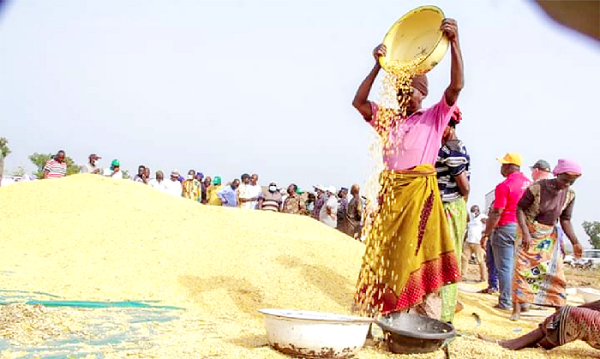
Eliminating foreign influx in our market: Grain Development Authority is the answer
Five years of the introduction of the Agricultural flagship programme, Planting for Food and Jobs (PFJ) calls for the need to address bottlenecks arising from its implementation.
With continuous growing interest in the commercial, semi-commercial and smallholder cultivation of crops, the emerging need now is to mechanise harvesting.
Advertisement
Observation
A recent tour of some farming communities and farms, especially in the northern part of the country, showed that most farmers were struggling to harvest their crops because of yields.
The current state of harvesting manually does not only lead to losses, but also discouraging, as most of the farmers are unable to efficiently and successfully harvest their crops.
Another observation during the tour was the compelling need to bring in more planter machines to mechanise the planting, instead of the current practice of broadcasting the seeds by some farmers.
Surely, the broadcasting is a waste of both land and seeds, and so, the availability of the planters will help in the efficient use of the land and also maximise the yields.
Foreign buyers
But as the farmers continue to increase their yields, a phenomenon that the Ministry of Food and Agriculture is yet to deal with is the flooding of neighbouring countries in our major markets to buy food items, especially the grains in large quantities.
These foreign buyers do not limit themselves to the major markets, some of them go the extra mile by moving as far as to the farm gates to buy, especially maize.
The development has led to local buyers and other users of these grains, particularly the poultry farmers to raise their voices against the practice and appealed to authorities, particularly the Ministry of Food and Agriculture in collaboration with the security agencies to stop the practices.
The concern is that the ministry needs to also deliberately restrict foreign purchases of our food items, just as China and Russia are restricting the export of fertiliser in favour of its local farmers.
Ghanaians are worried of food security with the influx of these foreign buyers, but the farmer does not have an option because without the foreign buyers, farmers will be discouraged because currently, the government is not in the position to purchase the grains.
Good for farmers
For the farmers, the foreign buyers are necessary to keep them in their farming business, as they see the practice as an assurance of a ready market for their farm produce and a reason to keep increasing his yields.
But commenting on the issue, the Minister of Food and Agriculture, Dr Owusu Afriyie Akoto, said the solution to addressing the foreign influx was the establishment of the Grains Development Authority.
He believes that such a body, which would be self-financing, with the capacity to go to the market to borrow money against its own assets is the answer.
Dr Akoto explained that with the grains authority, during harvesting or shortly after harvesting, it could compete with the foreign buyers at the farm gates and in the markets to buy as the prices fall to stock them in the warehouses thereby ensuring that the farmers do not lose out and yet the food items remain in the country.
He said a recent tour of northern Ghana and interactions with both regional and district directors of agriculture were clear that, "the participation of our neighbouring countries in the grains trade is a way of encouraging our farmers to carry on because it gives an assured market and a good rate of return on their investment.
" Prices are higher, they are not landed with stocks that nobody wants and without that intervention and without government intervention, that is what is going to happen," the minister explained.
Buffer Stock
Asked of the role of the National Food Buffer Stock Company (NAFCO) in buying food items from farmers, Dr Akoto admitted that the company did not have the muzzles to support any substantial trading, "because we are talking about a million metric tonnes, which come on the market.
"To trade a million metric tonnes of grains, you need hundreds of millions of dollars and not the GH¢50 million, facility the Agricultural Development Bank has for NAFCO," he explained.
Enough food
Sharing his experiences with the Daily Graphic during the tour of the north, Dr Akoto was excited that the five regions gave hope that there was enough food in the country as against earlier fears that there would be food shortage in the country.
The minister said the time he toured the area, even though harvesting was still ongoing, "it was clear that this year we are going to have huge surplus."
He explained that warehouses that were yet to be officially handed over were taken over by some of the farmers to stock their grains.
Dr Akoto, therefore, assured Ghanaians of Food sufficiency, saying, "we have no reason to fear food shortages or food insecurity."
Touching on the performance of the PFJ, the minister was excited that all the five modules - the crop module, the Rearing for Food and Jobs, the Planting for Export and Rural Development, the Mechanisation and the Greenhouse Technology had taken shape.



